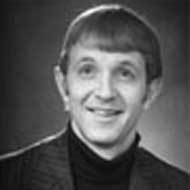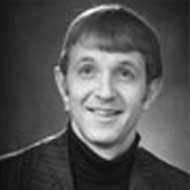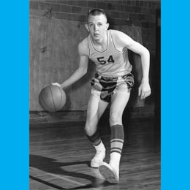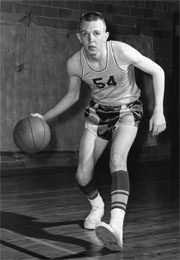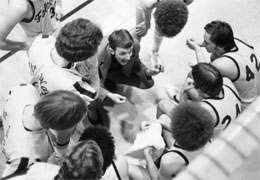Stephen Howard Morley g65
When Stephen "Steve" Howard Morley came to Fort Wayne Bible College (FWBC) in 1961 as a spindly four-sport athlete (cross country, tennis, basketball, baseball), few would have guessed he would become the heart and soul of FWBC athletics for over a quarter century, four years as a player, two as an assistant, and then a twenty year span as Coach, Athletic Director, and Instructor of Physical Education.
Steve's approach to athletics, whether as a player or as a coach, was above all one of fiery, scrappy intensity. He was a gifted utility player who could fill in at any position in almost any sport. Morley was also nearly as likely to finish a basketball game as the leading scorer and rebounder when he came off the bench as when he was a starter. By the time he graduated from FWBC in 1965 with a B.A. in Pastoral Training, he held the career records in basketball for both scoring (1,477) and rebounding (472). As a freshman, Steve once canned an outstanding 14-17 (82.3%) from the field. As a senior (1964-1965), he led the Ambassadors to their first winning season (14-9) in varsity intercollegiate play; capturing the Lincoln Christian College Tournament championship. Although he played before FWBC was a member of an athletic conference or any national athletic organization that would have afforded personal honors, Steve was named to more than one All-Opponent squad by rival schools such as Spring Arbor. During his student career, Steve also lettered four years in tennis, ran in some cross country races (for a program that never quite got off the ground), and helped inaugurate the baseball team during the spring of his senior year (1965).
After touring the Orient with a Sports Ambassadors/Venture for Victory basketball squad in the summer of 1965, setting a pattern for overseas sports ministry outreach followed by many of his future players, Steve began his coaching career as an assistant (1965-1967) to his father, Oswald Howard Morley. In the years following graduation, Steve would play some amateur club ball, scoring as many as 86 points in a game. He also studied at Grace Theological Seminary and would later earn a graduate degree from Drake University (1983).
In 1967, Steve took over the reins of FWBC athletics, although the road to parity with other schools was a rough one. His first season as head coach, the tennis team went 1-7, the basketball team 8-20, and the baseball team 2-8. The next year the basketball team went 2-22. Building genuinely competitive collegiate programs would not be easy when nearly all players in all sports were walk-ons, none were on athletic scholarships, there was virtually no athletic budget, and the school lacked regulation athletic facilities. Initially, success came on the individual level with gifted athletes such as Dick Lovestrand, Mick Mills, and Ken Conrad.
Then, in the fall of 1969, a whole team slowly came together that began what one writer has called the "Seven Golden Years" of Falcon men's basketball. FWBC joined and soon dominated the North Central Christian Athletic Conference (NCCAC), repeatedly winning conference and conference tournament titles, as well as various in-season tournaments and National Christian College Athletic Association (NCCAA) district championships. The most obvious success came when the Falcons won the inaugural NCCAA Division II National Championship in 1976, though earlier teams who had lacked access to such a venue still left their mark. The 1970-1971 squad went to the NCCAA National Tournament before there was a division for Bible colleges; the 1971-1972 team (21-5) led the entire nation (some 700 National Association of Intercollegiate Athletics [NAIA] schools at that time) in defense (59.7 points per game) and rebounding (64.2%); while the 1972-1973 team (23-6) won the Bethel Invitational (now Gates Automotive Classic) before Bethel College ever did and captured both NCCAC (as co-champions) and NCCAC tournament titles against outstanding competition. At the end of the 1972-1973 season, Steve was named the NCCAA District 3 Coach of the Year, the first of various coaching honors that would come his way.
Bob Kirby, Bruce Masopust, Pete Strubhar, Bill Campbell, Todd Habegger, and Larry Lewis were among the more memorable names from that era who also went overseas with Sports Ambassadors/Venture for Victory, with Bob, Bruce, Todd, and Bill each playing on two squads.
With the development of the NCCAA Division II for Bible colleges, FWBC players began to gain district and national honors. Steve would lead the Falcons to the NCCAA Division II National Tournament again in 1976-1977 and 1978-1979; but the glory years were now over. Gary Ringenberg (two-sport Falcon Most Valuable Player [MVP]), Calvin Rychner (All-American), and Ray Hilton (two-sport All-American) were among Steve's better-known players from his later years at Fort Wayne.
Even though the baseball program folded after 1973, the athletic programs actually expanded with the addition of women's volleyball and women's basketball, both in 1973-1974, and then also of men's soccer in 1980-1981. While varsity tennis had been successfully revived in 1973-1974, and had maintained a solid history of winning seasons and competitive conference play, the program came to an end with the addition of men's soccer. Varsity athletics had now crossed the gender barrier.
Steve finished his coaching career at Southwestern College in Phoenix, Arizona, where he won a men's basketball NCCAA Division IIA National Championship in 1997, becoming the first coach to win NCCAA titles for two different schools. In 2000, he was inducted into the NCCAA Hall of Fame in Greenville, South Carolina, while in 2001 he was named Distinguished Alumnus for Professional Achievement by Taylor University Fort Wayne. As early as September 1989, he had been honored for his years of service at Fort Wayne with the naming of the Morley Weight Training Center in the Gerig Activities Center. He retired from Southwestern in 2006.
Steve has sought to follow his Lord Jesus Christ since an early age, and his passion for ministry matches his enthusiasm for athletics. He currently serves at Cornerstone Berean Church in Kearney, Nebraska. He is married to Kaye Lynn and is the father of Todd Stephen Morley and Lanette SueAnn Chapman and the grandfather of four grandchildren.


